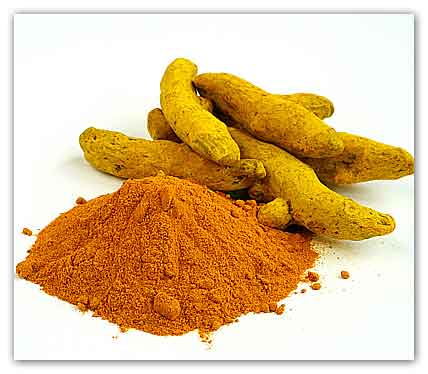|
Curcumin, a natural yellow phenolic compound present
in Curcuma longa (turmeric) is a natural antioxidant
and has shown many pharmacological activities such
as anti-inflammatory, anti-microbial, anti-cancer,
and anti-Alzheimer in both preclinical and clinical
studies.
Moreover, curcumin has hepatoprotective,
nephroprotective, cardioprotective, neuroprotective,
hypoglycemic, antirheumatic, and antidiabetic
activities and it also suppresses thrombosis and
protects against myocardial infarction.

Particularly, curcumin has demonstrated efficacy as
an anticancer agent, but a limiting factor is its
extremely low aqueous solubility which hampers its
use as therapeutic agent. Therefore, many
technologies have been developed and applied to
overcome this limitation.
Cancer conventional therapies cause widespread
systemic toxicity and lead to serious side effects
which prohibit their long term use. Additionally, in
many circumstances tumor resistance and recurrence
is commonly observed.
Therefore, there is an urgent need to identify
suitable anticancer therapies that are highly
precise with minimal side effects.
Curcumin’s widespread availability, safety, low cost
and multiple cancer fighting functions justify its
development as a drug for cancer treatment.
A growing list of nanomedicine(s) using first line
therapeutic drugs have been approved or are under
consideration by the Food and Drug Administration
(FDA) to improve human health. These nanotechnology
strategies may help to overcome challenges and ease
the translation of curcumin from bench to clinical
application.
Prominent research is reviewed which shows that
advanced drug delivery of curcumin (curcumin
nanoformulations or curcumin nanomedicine) is able
to leverage therapeutic benefits by improving
bioavailability and pharmacokinetics which in turn
improves binding, internalization and targeting of
tumor(s).
Outcomes using these novel drug delivery systems
have been discussed in detail. A review also
describes the tumor-specific drug delivery system(s)
that can be highly effective in destroying tumors.
Such new approaches are expected to lead to clinical
trials and to improve cancer therapeutics.
Curcumin (CUR) is a hydrophobic polyphenolic
compound derived from the rhizomes of Curcuma longa.
This natural compound has a long history of use as
curry (turmeric) in East Asian countries.
Commercially available curcumin consists of a
mixture of three curcuminoids [diferuloylmethane
(~77%), demethoxycurcumin (~18%), and
bisdemethoxycurcumin (~5%)].
Curcumin exhibits keto-enol tautomerism, having a
predominant keto form in acidic and neutral
solutions and a stable enol form in alkaline media.
Curcumin is “Generally Recognized as Safe (GRAS)” by
the Food and Drug Administration (FDA).
Curcumin is characterized by a wide range of
antibacterial, antifungal, antiviral, antioxidative,
antiinflammatory, and antiproliferative activities.
Curcumin has demonstrated strong cancer preventive
activity, including prevention of tumor initiation,
promotion, metastasis, and angiogenesis in
experimental animal systems, against a wide range of
tumor cells.
Curcumin has pleiotropic properties that modulate
numerous targets including proteins (thioredoxin
reductase, cyclooxygenase 2 (COX-2), protein kinase
C (PKC), 5-lipoxygenase, and tubulin), transcription
factors, growth factors and their receptors,
cytokines, enzymes, and gene regulating cell
proliferation and apoptosis.
Because of this multi-targeted behavior, curcumin
can perform a wide spectrum of actions while smart
drugs or therapeutic drugs have only one target and
are eliminated from the cells if they do not reach
the right compartment.
The authors suggested that the estrogen mimicking
activity of curcumin-PEG could contraindicate the
treatment of breast and ovarian cancers, whereas
anti-androgenic effects would be advantageous for
the treatment of e.g. prostate cancer.
For more information
Curcumin Nanomedicine: A Road to Cancer Therapeutics
Murali M. Yallapu, Meena Jaggi, and Subhash C.
Chauhan
link...
Curcumin nanoformulations: a review of
pharmaceutical properties and preclinical studies
and clinical data related to cancer treatment.
Ornchuma Naksuriyaa, Siriporn Okonogia, Raymond M.
Schiffelersc, Wim E. Hennink
link...
MDN |